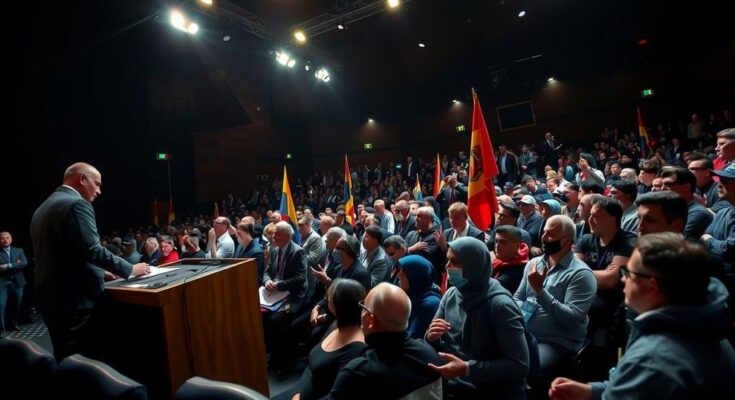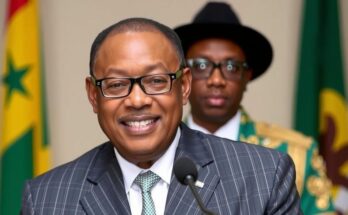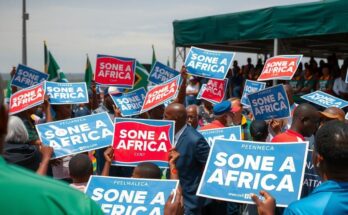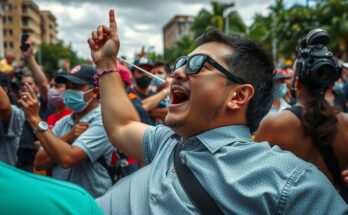The Antifascist International For a New World assembly in Caracas brought together over 400 delegates to strategize against fascism, resulting in the formation of a new committee and announcements for educational initiatives. President Maduro highlighted the establishment of a World Antifascist School and emphasized the importance of combating various forms of oppression, including cyberfascism.
Recently, Caracas hosted a significant assembly known as the Antifascist International For a New World, which convened more than 400 delegates from various nations. The event, held at the Simón Bolívar Park Convention Center, was presided over by Foreign Minister Yván Gil and Rander Peña of the United Socialist Party of Venezuela (PSUV). This gathering was a follow-up to the World Congress against Fascism that occurred in September, aimed at operationalizing its action plan to combat fascist ideologies globally.
During the two-day congress, delegates engaged in comprehensive discussions divided across seven specialized working groups. Grecia Colmenares, the Minister for Youth, is tasked with galvanizing youth and student involvement, while Deputy Gustavo Villapol oversees communication efforts, tackling counter-narratives within social media. Additional groups focus on critical themes, including the examination of People’s Power under Pedro Infante’s leadership, human rights discussions led by Deputy Blanca Eekhout, and cultural resistance under Clara Vidal.
The establishment of the Antonio José de Sucre National School of Venezuelan Youth was one of the congress’s pivotal announcements; this institution is designed to serve as the nucleus of a World Antifascist School. President Nicolás Maduro underscored the necessity of global educational integration, drawing inspiration from training methodologies in countries such as China, India, and Mexico. This initiative emerged from a collective desire to foster think tanks on fascism and develop robust training facilities for the anti-fascist cause.
Over 1,000 young delegates from 72 nations contributed their insights at the congress, focusing on strategies to counteract fascist and neo-fascist ideologies. President Maduro asserted, “We committed ourselves to fight against all forms of oppression, recognizing that fascism and Zionism arise from the same source of hatred.” He affirmed Venezuela’s unwavering commitment to fight cyberfascism while safeguarding national sovereignty and human rights on a global scale.
Furthermore, Maduro remarked upon the nature of fascism, characterizing it as a transformative threat that exploits societal disillusionment. “Fascism feeds on the hopelessness of those who feel dispossessed or threatened, offering a false sense of control and belonging through exclusionary ideologies,” he stated. He identified the critical need to challenge these detrimental narratives and cultivate restorative dialogues that address the root causes of despair and societal division.
In closing, Maduro expressed enthusiasm for the congress’s resolutions, declaring the movement born in Caracas as essential for opposing external imperial influences. He articulated the aspiration for a multipolar world, insisting that innovative community strategies and collective resistance methods are vital components of that vision.
The Antifascist Congress represents a substantial international effort aimed at unifying diverse groups against fascism and authoritarianism. This initiative reflects a growing concern for rising extremist ideologies across the globe. In the aftermath of the September World Congress against Fascism, the establishment of the new committee in Caracas demonstrates Venezuela’s active role in global anti-fascist movements. By creating educational institutions and mobilizing youth, the Venezuelan government seeks to combat not only fascism but also related ideologies, fostering a broader commitment to human rights and international cooperation.
The Antifascist Congress hosted in Caracas marks a pivotal moment in the collective struggle against fascism and authoritarianism on a global scale. Through the establishment of a dedicated committee and the upcoming World Antifascist School, Venezuela aims to lead a united front against oppressive ideologies. President Maduro’s insights underscore the importance of addressing the root causes of societal despair while promoting inclusive dialogue, ensuring that the fight against fascism remains a priority for future generations.
Original Source: www.dailynewsegypt.com




